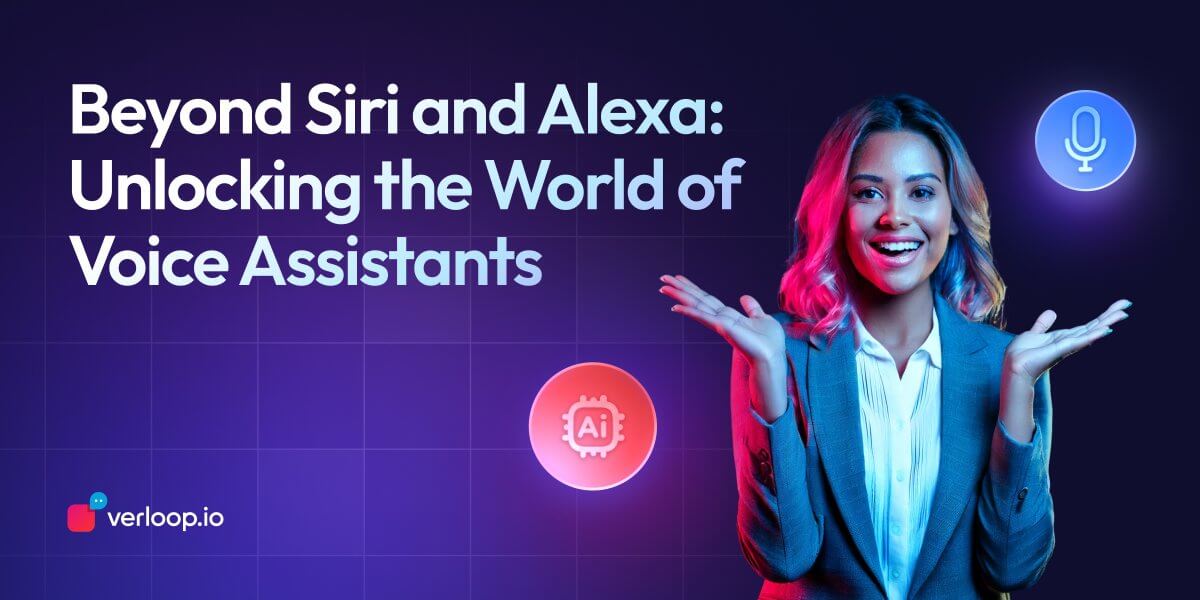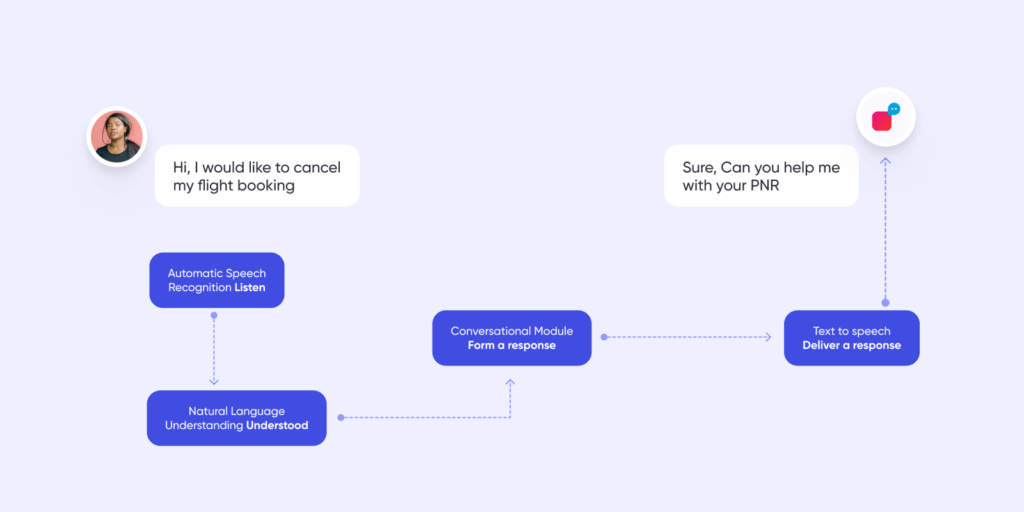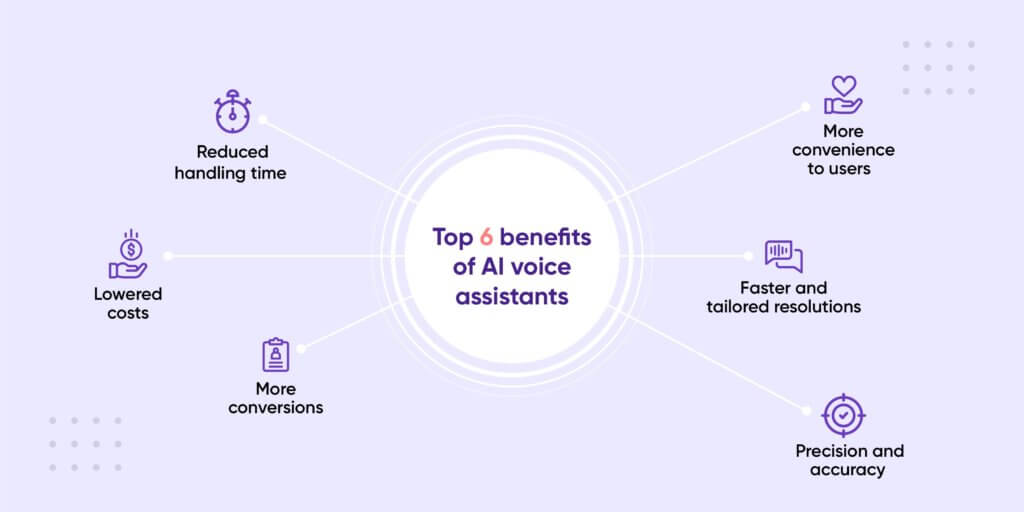Beyond Siri and Alexa: Exploring Voice AI Calls Platforms Use Cases in Various Industries
- February 12th, 2025 / 4 Mins read
-
 Aarti Nair
Aarti Nair

Beyond Siri and Alexa: Exploring Voice AI Calls Platforms Use Cases in Various Industries
- February 12th, 2025 / 4 Mins read
-
 Aarti Nair
Aarti Nair
Artificial Intelligence (AI) voice assistants are increasingly everywhere, transforming how we interact with our devices and access information. These digital companions have progressed from basic speech recognition systems to advanced conversational AI platforms, providing a wide range of requirements and tastes. Let’s explore the interesting subject of AI voice assistants, including its capabilities, benefits, pitfalls, and hopeful future.
AI voice assistants have come a long way significantly since their inception. Speech recognition originated in the 1950s, but major progress was not made until the late twentieth century. Early systems, such as IBM’s Shoebox and Bell Labs’ Audrey, paved the way for subsequent improvements. Nevertheless, it was Apple’s release of Siri in 2011 that propelled AI voice assistants towards the public eye. Following Siri’s popularity, other tech behemoths like Amazon with Alexa as well as Google using Google Assistant swiftly entered the market, accelerating the use of this technology.
How Voice AI Works
Three key technologies underpin AI voice assistants: speech recognition, natural language processing (NLP), as well as text-to-speech (TTS). These technologies work together to interpret and respond to user requests.
- Speech Recognition is similar to an interpreter listening to a foreign language as well as transforming it into something understanding. Turning speech into text allows the system to accurately understand the user’s input.
- Natural Language Processing serves as the brain of an AI, decoding the concepts behind the words. It examines the text produced by speech recognition, translates the user’s intent, and develops an appropriate answer.
- Text-to-speech closes the loop by translating the AI’s reaction into spoken words, resulting in a flawless conversational interaction for the user.
Think about questioning your AI voice assistant regarding the weather. It listens to your question (Speech Recognition), recognizes that you’re inquiring regarding the temperature (Natural Language Processing), and then answers with a spoken response (Text to Speech).

The interaction demonstrates the transformative power of conversational AI by seamlessly combining modern technologies to simplify processes, improve communication, and improve user experiences. As AI evolves and innovates, such interactions provide only a peek at the limitless possibilities that lie in advance, suggesting a future in which technology effortlessly merges into our lives, making daily tasks more effective, comfortable, and pleasant.
Suggested Reading: If You have a Customer Support Team, You Need Voice Chat
What can Voice AI do?
AI voice assistants have a wide range of capabilities and are constantly evolving. They are gradually becoming multifunctional personal assistants that are capable of handling an extensive list of functions, rather than being limited to simple chores.
Internet of Voice
The Internet of Voice offers businesses a compelling opportunity to revolutionise customer engagement and streamline operations.
By integrating voice-enabled technologies, companies can enhance customer experiences with intuitive interactions and personalised assistance. Voice-activated assistants can address inquiries, facilitate purchases, and provide recommendations, driving satisfaction and loyalty.
Internally, hands-free control of machinery and inventory systems improves efficiency. Leveraging the Internet of Voice empowers businesses to gain a competitive edge, boost productivity, and capitalise on new revenue streams in the digital era.
Customer Service
Utilising voice assistants for customer service optimises interactions and boosts efficiency. By integrating voice-enabled technologies, companies provide seamless and personalised support, enhancing satisfaction and loyalty.
Voice assistants streamline inquiries, offering instant access to solutions and reducing response times. This innovative approach not only improves the customer experience but also lightens the workload for human agents, ultimately driving growth in today’s competitive market.
Voice-based search
In the world of voice search, businesses must act quickly to secure unique names for their Google Actions and Alexa Skills due to strict naming rules. Being prompt ensures visibility and sets a brand apart from competitors. Additionally, leveraging brand recognition increases the chances of being recommended to users searching for specific products or services.
Suggested Reading: How to Measure the Success of Your Voice AI Bot?
Benefits of Voice Assistants
Did you know that 58% of consumers use voice search to find local business information? Voice assistants simplify exploration, conversion, and customer support, making them invaluable tools for businesses. Here’s why integrating a voice assistant into your business strategy is beneficial:

1. Enhanced Convenience
Voice assistants offer a user-friendly way for customers to seek support and obtain answers to their queries in natural language, akin to conversing with a live agent. This eliminates the need for constant human intervention for repetitive questions, providing seamless support experiences.
2. Swift and Personalised Solutions
Voice AI assistants are available round-the-clock to provide tailored responses and resolutions based on previous interactions, ensuring faster query resolutions and happier customer experiences. Users can access AI voice assistants instantly, bypassing wait times and support queues.
3. Reduced Handling Time
By leveraging voice input and output, voice AI significantly decreases average handling time, alleviating the burden on support staff and expediting resolution cycles compared to traditional text-based methods.
4. Cost Savings
utomating customer interactions leads to significant cost savings by reducing the need for large support teams and minimizing agent workload. A retail company handling high volumes of inquiries about order tracking, refunds, and product availability can deploy a Voice AI system to efficiently answer repetitive questions. This allows human agents to focus on complex issues, ultimately reducing support costs while maintaining high service quality.
5. Precision and Reliability
Powered by artificial intelligence, voice assistants continuously learn from interactions, enabling them to provide accurate responses to a wide range of queries with precision. Their sharp AI algorithms ensure reliable and consistent performance.
6. Increased Conversions
An AI voice assistant can actively engage users, addressing their needs before they abandon their carts, thus boosting conversions by offering directed solutions tailored to their specific use cases. Integrating a voice assistant into your business operations can lead to improved customer satisfaction, streamlined processes, and ultimately, higher conversions.
7. Scalability
Voice AI can handle thousands of calls simultaneously, ensuring that customers receive timely and consistent responses, even during peak hours. For instance, a telecom provider experiencing a sudden spike in service inquiries due to an outage can rely on Voice AI to address general outage-related queries, provide estimated resolution times, and escalate only urgent technical concerns to human support. This prevents long wait times and improves customer satisfaction.
8. Streamlined Customer Support
By automating repetitive queries, Voice AI allows human agents to focus on high-value interactions, improving efficiency and response times. An insurance company, for example, can use Voice AI to handle policy-related inquiries such as premium due dates, claim status, and document requirements. This frees up human agents to focus on complex claims, customer disputes, and personalized advisory services, enhancing overall productivity.
9. Refined Customer Experience
Voice AI enhances the customer journey by offering multilingual support, accurate query resolution, and instant responses. A multinational e-commerce platform deploying Voice AI enables a French-speaking customer in Canada to receive seamless support in their preferred language. This level of personalization fosters customer loyalty and improves their overall experience.
10. Personalized and Automated Customer Interactions
Voice AI leverages customer data to deliver highly personalized responses and recommendations. A travel agency’s Voice AI system, for example, can recognize a returning customer and greet them by name. It suggests travel packages based on their previous bookings and preferences, creating a more engaging and customized experience that feels personal and relevant.
Implementing Voice AI offers businesses a competitive edge by providing 24/7 support, reducing costs, and enhancing customer engagement. Whether in retail, banking, healthcare, or telecommunications, Voice AI is improving customer interactions. By leveraging this technology, organisations can improve efficiency, drive customer loyalty, and stay ahead in an increasingly digital world.
Current Challenges with Voice Assistants
While voice assistants hold great promise for revolutionising technology, they still face significant hurdles in establishing a strong presence in the corporate world. These challenges include:
Improving Speech Recognition:
Enhancing speech recognition is crucial for voice assistants to perform effectively in diverse environments, including noisy settings and long-distance interactions. Further advancements are needed to support tasks like live interviews, family dinner conversations, and meetings. Additionally, addressing the recognition and availability of different languages and niche topics remains a priority for comprehensive usability.
Contextual Understanding:
Ensuring accurate contextual understanding is essential to avoid misunderstandings and provide relevant responses. Despite advancements, voice assistants still struggle to interpret the context of spoken words accurately. This challenge necessitates ongoing improvements to align user intentions with appropriate actions or information.
Accents and Dialects:
Accommodating various accents and dialects presents a significant hurdle for voice assistants, impacting their ability to comprehend user commands swiftly and accurately. Differences in speech patterns, such as those between American and Scottish English, pose challenges, requiring solutions that account for diverse linguistic nuances. Additionally, factors like colds and voice changes further complicate the assistant’s ability to understand users effectively.
Key Statistics on Voice AI Adoption
The growing adoption of Voice AI is backed by compelling statistics, showcasing its transformative impact on businesses and consumers alike. Here are some key insights:
Market Growth
-
The global voice assistant market is projected to reach $11.2 billion by 2026, indicating rapid adoption across industries.
-
In 2020, there were approximately 4.2 billion digital voice assistants in use worldwide. This number is expected to double, reaching 8.4 billion units by 2024, surpassing the global population. (Statista)
Customer Preference
-
Approximately 72% of consumers prefer interacting with AI voice assistants for quick queries, highlighting the demand for instant responses.
-
In 2022, nearly half of the U.S. population, around 142 million individuals, used voice assistants. This figure is anticipated to rise to 157.1 million by 2026. (Statista)
Operational Efficiency
-
Companies implementing Voice AI have seen a 30% increase in customer retention and an 85% improvement in agent efficiency.
-
The speech recognition market is projected to grow significantly, with an expected annual growth rate of 13.09% from 2025 to 2030, resulting in a market volume of $15.87 billion by 2030. (Statista)
With its ability to provide 24/7 availability, cost savings, scalability, and enhanced engagement, Voice AI is becoming a crucial tool for businesses worldwide. Moreover, statistical trends highlight its increasing relevance in consumer preferences and operational efficiency. As companies continue to integrate this technology, they stand to benefit from improved customer satisfaction, streamlined support processes, and a strong competitive edge in the digital age.
Industry-Specific Applications of Voice AI
Voice AI platforms are making a significant impact across various industries, enhancing customer interactions and optimizing business operations. Here’s how different sectors are leveraging this technology:
Hospitality
Hotels deploy AI voice agents to handle booking inquiries, room service requests, and provide local recommendations, offering guests a seamless and convenient experience. This automation improves service efficiency and enhances guest satisfaction.
Healthcare
Clinics and hospitals use Voice AI to manage appointment scheduling, prescription refills, and patient follow-ups. This reduces administrative burdens, ensures timely patient care, and improves overall operational efficiency.
Retail
Retailers leverage Voice AI for customer support, order tracking, and personalized shopping assistance. By guiding customers through product selections and answering queries, businesses can increase sales and enhance customer satisfaction.
Banking
Banks integrate Voice AI to facilitate balance inquiries, fraud detection, and customer support. AI-driven voice assistants can assist customers with transactions, loan inquiries, and account management, improving service accessibility and security.
Finance
Financial institutions use Voice AI to automate investment advice, handle payment reminders, and streamline loan application processes. By offering real-time financial assistance, these AI solutions improve user experience and operational efficiency.
By integrating Voice AI platforms, businesses across these industries can enhance customer interactions, streamline operations, and maintain a competitive edge in an increasingly digital landscape.
The Future of AI Voice Assistants
Despite these limitations, the probable future with AI voice assistants is bright. Advances in natural language comprehension will allow these systems to better understand context while participating in deeper conversations with people. Emotional intelligence will enable AI voice assistants to identify as well as react to human emotions, hence improving the user experience. Context-aware interactions will allow for seamless integration across several devices and environments, resulting in truly immersive and tailored experiences for users.
As we move forward towards such an exciting future, it is critical to prioritise ethical development processes, to make sure AI voice assistants are developed with user confidentiality, ethics, including security in mind. By adopting these ideas and realising AI’s revolutionary potential, we may create a future in which conversational AI improves our lives in a manner we never imagined possible.
Conclusion
Finally, AI voice assistants transformed from simple tools to necessary partners in our daily lives. Despite the obstacles they face, this technology’s promise to improve ease, accessibility, and customisation is obvious. As we traverse the ever-changing environment of AI, we must prioritise ethical development, protect user privacy, and handle security concerns. By doing so, we may pave the path for a future in which AI voice assistants effortlessly integrate throughout our lives, providing us with new capabilities and enriching the human experience.
Subscribe to our monthly newsletter to remain up to date on the newest breakthroughs in voice assistant technology. Don’t pass up the opportunity to see the possibilities of AI yourself – get a demo today!
FAQs on Voice Assistants
1. What is an AI-based voice assistant?
Voice assistants are devices/apps that respond to voice commands through Wi-fi or Bluetooth devices. AI-based voice assistants are AI technology, natural language processing and ML models, to respond to humans. Using the technology, the device synthesises the user’s message, breaks it down, evaluates it, and offers a meaningful response in return.
2. Do voice assistants use AI?
Yes, all voice assistants use AI. However, it’s not necessary that they use conversational AI technology. Intelligent voice assistants such as Siri, Alexa, and Google Assistant use conversational AI to have more natural conversations.
3. Which domain of AI do digital voice assistants use?
Voice assistants use the natural language processing (NLP) domain of AI to converse with humans. This enables them to break down human language into easy-to-understand machine language and respond back in a language that humans can understand.
4. What is the future of voice assistants?
With the convenience and familiarity voice assistants bring to the table, their usage is expected to grow. According to a survey, almost 48% of Americans will use voice assistants by 2025.
5. How voice assistants are changing our lives?
Thanks to the application of conversational AI to voice assistants, we can use them in various use cases. Earlier people used to use it only for playing music and making checklists. With advancements in technology, it can do much more now, from asking questions to getting directions, from shopping through voice devices to getting informed about the latest updates.







